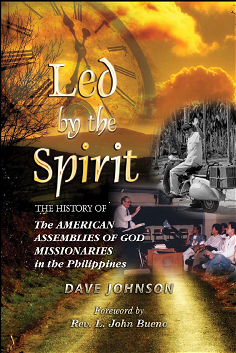Led by The Spirit: Interned by the Japanese
Not only did Johnson’s citizen’s group watch for planes, their mountain perch at five thousand feet above sea level allowed them to watch the advance of the Japanese infantry toward Baguio from Lingayen Gulf. They probably knew that the Allies had no blocking force of sufficient size to stop the Japanese from reaching them. Fear was the order of the day. On December 27, the city faced the inevitable and surrendered to the Japanese. Rena Baldwin remembers that the night before, the missionaries had a sweet prayer meeting and testified that God had given them peace, a peace that would be sorely tried in the months ahead.6 Leland Johnson remembers that they also did something practical, especially for Pentecostals; they sat down and ate a good meal! For the next three years, life would be anything but normal.
Sent to the Concentration Camp
Baldwin recalled what happened in their fateful first personal encounter with the Japanese:
Sometime after midnight the Japanese came for us and took us to the British School (Brent) where so many were already… We were all lined up facing a machine gun while the general made a speech through his interpreter. The only building we were allowed to occupy was already full, and new groups were arriving. We were there all day and on the following day (December 29) were told we would be going to a different place.

This is an excerpt from Dave Johnson, Led By The Spirit: The History of the American Assemblies of God Missionaries in the Philippines (Pasig City, Philippines: ICI Ministries, 2009)
Faint for lack of food, we were herded onto the tennis court. Facing a machine gun and with planes circling over our heads, we were told we must walk to our destination. If we wanted to be sure of suitcase and bedding, we must carry them ourselves. Furthermore, they said the men would be sent to one place, the mothers and children to another, and unmarried women and girls to yet another. We were all hurried off under heavy guard. Soon we found where we were going, not to some far distant place as we had been led to suppose, but to different sections of Camp John Hay, comparatively nearby.7
Johnson reported that during the time of preparation for this trek he and Helen were given unusual strength to arrange their belongings. God was sustaining them. Leaving what they didn’t need behind and with Sammy and Constance holding hands, knowing that Leland would be separated from them, the Johnsons prepared for an unknown future. One can only wonder at the depth of fear and grief they must have felt. At one point in the trek, Johnson caught a glance of Sammy and Constance, still holding hands, with Elizabeth Galley assisting them. Her kindness to his children must have touched his heart.
Camp John Hay had been severely bombed and was hardly fit for human habitation, something that never bothered the Japanese. Among other things, the water pipes had been destroyed. Obtaining drinkable water would be a difficult chore. It would also mean that they had nothing with which to clean their living quarters. When dysentery swept the camp and even the guards recognized that they too, were at risk, the pipes were repaired. Fortunately no one died.
In January 1942, a record rainfall of twenty-five inches fell. Gladys Knowles felt that this provision of water may have saved lives.8 Knowles also became gravely ill with jaundice at about this time. Someone managed to provide her with a cooked potato which not only strengthened her faith, but also put her on the road to recovery.9 One advantage of sleeping in a barracks with a damaged roof was that Leland Johnson could look up at the stars at night and meditate on the goodness of God. Knowing that He was there and was watching over them was a great comfort to him. The missionaries learned to see the hand of God in many similar situations and events.
One shock followed another. At one point the Japanese camp commandant, a Lieutenant Makibo, announced that the women and girls would be required to serve as servants to the Japanese high command. No one missed the real intent of this, knowing full well that they would be raped. Rallying to the defense of their wives and daughters, the men showed great courage in telling the Japanese that they would have to kill every man in the camp first. This must have been seen as ridiculous to their captors as the prisoners had no weapons at all, and the Japanese were well-known for using their bayonets at the slightest provocation. In what can only be described as divine intervention, the Japanese backed down and no one was ever molested in any way. Given the character of the Japanese military elsewhere, this was in fact a miracle.
Category: Church History, Winter 2020


